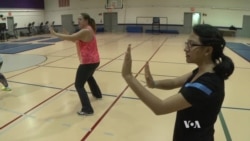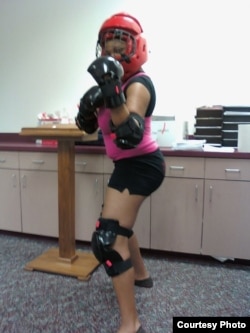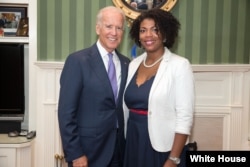Lindsay Aramayo is walking along by herself when a stranger grabs her from behind and pulls her to the ground. She uses her fists and legs to hurt her aggressor and is able to struggle free.
But once back on her feet, another man confronts her head on. She punches him in the face and kicks him multiple times in the groin.
Breathing hard, Aramayo backs away from the men in a defensive stance, then turns and quickly flees the scene.
This violent encounter was not real. It was the last part of a 15-week self-defense class at Maryland's Montgomery College.The simulated attack was conducted by certified Rape Aggression Defense (R.A.D) instructors. Two of them – a Montgomery College professor and the police chief of the city of Bowie, Maryland – were outfitted with protective gear from head to toe as they took punches and kicks from about a dozen students.
It was a chance for young women like Aramayo – who was also wearing protective padding – to demonstrate what they’d learned during the program.
"In the beginning, I was really, really shy. I didn’t want to do anything," said Aramayo. "I was throwing mediocre punches … but then at the end if I’m fighting for my life and survival, I’m going to do whatever I have to do."
Recent news reports about gang rapes in India and sexual violence at U.S. universities have thrust the issue of sexual assault into the spotlight. According to a new study by the U.S. Department of Justice, between 1995 and 2013, women age 18 to 24 experienced the highest rate of rape and sexual assault among females of all age groups. And many of those assaults are taking place at American colleges and universities.
Aramayo said the class at Montgomery College has been a great learning tool, because it's left her knowing "that I can defend myself."
But while self-defense is an important component of preventing sexual assault, campus security advocate Daniel Carter said it doesn’t address the root of the problem.
"Eighty to 90 percent of campus sexual violence involves acquaintances," he said, "so it’s not the stranger in the alleyway that is the greatest threat. It is the person at the party they’re with, that they are in the club with, they’re on a date with."
What’s really needed, he said, is a shift in societal attitude.
"We’ve got to change our culture of tolerating it, of allowing both stranger and acquaintance perpetrators to reoffend and having a society that allows it and looks the other way," Carter said.
He added, "Everybody needs to be a part of the solution to campus sexual violence. From the colleges and universities themselves, from the campus police to the deans of students, to the presidents of the colleges and universities, to parents, to students, to faculty to the news media, to the politicians."
Kassie Edwards agrees. In October 2008, she was sexually assaulted at her university in Florida while working at the campus library. She was reshelving books when she noticed a man standing nearby, wearing a hoodie. She didn't think anything of it.
"I went down the aisle to put the books on the shelf," she said, "and then the man came from behind and he put me in a chokehold and he brought me to the floor, and that’s when he raped me."
Edwards reported the assault to police but her attacker was not apprehended. He went on to rape at least three other women before he was finally arrested and convicted for the rapes – and for the murder of his girlfriend.
Jumbled feelings
In the aftermath of her attack, Edwards said, she experienced a mixture of emotions.
"I felt shock," she recalled. "I just couldn’t believe that someone would assault somebody in the middle of the day, in the library, and I felt angry. I felt angry that it happened to me. It was so random. I felt alone."
Those feelings motivated her to reach out to other rape victims. She decided to share her story, to get the word out about sexual assault. She felt it was important to stress that an attack is never the victim's fault.
"Behind closed doors, I hear people making comments like, ‘Oh, why does she stay with him?' or 'Why was she wearing what she was wearing?' or 'Why was she out late at night?' instead of questioning, ‘Well, why did he rape her? Why did he violate somebody else’s civil rights?’ So I think we need to change the culture or our thinking."
Edwards has worked with the Obama administration on its campaign to end sexual violence on college and university campuses.
In September, she attended an event commemorating the 20th anniversary of the Violence Against Women Act. It was written by then-U.S. Senator Joe Biden and signed into law on September 13, 1994.
Edwards said someone asked Biden why he was so vested in the Violence Against Women Act, "and he said, ‘My mother wasn’t raped, my sister wasn’t raped, my wife wasn’t raped. It’s just I, as a man, I’m taking responsibility for the safe well-being of women in society.’ And so he inspired me to further affirm why I’m doing this."
Among the initiatives launched by the Obama administration is a public service announcement featuring movie stars, musicians and politicians – including the president.
'Not your fight alone'
In a speech at the September event, Obama acknowledged that there is still more to be done.
"As far as we’ve come, the fact is that from sports leagues to pop culture to politics, our society still does not sufficiently value women," he said. "We still don’t condemn sexual assault as loudly as we should. We make excuses. We look the other way. The message that sends can have a chilling effect on our young women."
Echoing Edwards' message, the president added, "This is not your fight alone. This is on all of us, every one of us, to fight campus sexual assault. You are not alone. And we have your back and we are going to organize campus by campus, city by city, state by state. The entire country is going to make sure that we understand what this is about and that we’re going to put a stop to it."
As the issue of sexual assault continues to be discussed, the hope is that one day soon, women of all ages can walk the streets and campuses of America, without fear.














